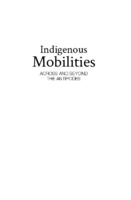Indigenous Mobilities
Across and Beyond the Antipodes
| dc.contributor.editor | Standfield, Rachel | |
| dc.date.accessioned | 2018-07-03 11:01:50 | |
| dc.date.accessioned | 2020-04-01T12:36:54Z | |
| dc.date.available | 2020-04-01T12:36:54Z | |
| dc.date.issued | 2018 | |
| dc.identifier | 1000212 | |
| dc.identifier | OCN: 1051776515 | en_US |
| dc.identifier.uri | http://library.oapen.org/handle/20.500.12657/29734 | |
| dc.description.abstract | "This edited collection focuses on Aboriginal and Māori travel in colonial contexts. Authors in this collection examine the ways that Indigenous people moved and their motivations for doing so. Chapters consider the cultural aspects of travel for Indigenous communities on both sides of the Tasman. Contributors examine Indigenous purposes for mobility, including for community and individual economic wellbeing, to meet other Indigenous or non-Indigenous peoples and experience different cultures, and to gather knowledge or experience, or to escape from colonial intrusion. ‘This volume is the first to take up three challenges in histories of Indigenous mobilities. First, it analyses both mobility and emplacement. Challenging stereotypes of Indigenous people as either fixed or mobile, chapters deconstruct issues with ramifications for contemporary politics and analyses of Indigenous society and of rural and national histories. As such, it is a welcome intervention in a wide range of urgent issues. Second, by examining Indigenous peoples in both Australia and New Zealand, this volume is an innovative step in removing the artificial divisions that have arisen from “national” histories. Third, the collection connects the experiences of colonised Indigenous peoples with those of their colonisers, shifting the long-held stereotypes of Indigenous powerlessness. Chapters then convincingly demonstrate the agency of colonised peoples in shaping the actions and the mobility itself of the colonisers. While the volume overall is aimed at opening up new research questions, and so invites later and even more innovative work, this volume will stand as an important guide to the directions such future work might take.’ — Heather Goodall, Professor Emerita, UTS" | |
| dc.language | English | |
| dc.subject.classification | thema EDItEUR::N History and Archaeology::NH History::NHB General and world history | en_US |
| dc.subject.classification | thema EDItEUR::N History and Archaeology::NH History::NHT History: specific events and topics::NHTB Social and cultural history | en_US |
| dc.subject.classification | thema EDItEUR::J Society and Social Sciences::JB Society and culture: general::JBS Social groups, communities and identities::JBSL Ethnic studies | en_US |
| dc.subject.classification | thema EDItEUR::J Society and Social Sciences::JP Politics and government | en_US |
| dc.subject.other | History | |
| dc.subject.other | Indigenous peoples | |
| dc.subject.other | Australia | |
| dc.subject.other | New Zealand | |
| dc.subject.other | politics | |
| dc.subject.other | Aboriginal Australians | |
| dc.subject.other | Maori people | |
| dc.subject.other | Ngai Tahu | |
| dc.title | Indigenous Mobilities | |
| dc.title.alternative | Across and Beyond the Antipodes | |
| dc.type | book | |
| oapen.identifier.doi | 10.22459/IM.06.2018 | |
| oapen.relation.isPublishedBy | ddc8cc3f-dd57-40ef-b8d5-06f839686b71 | |
| oapen.relation.isbn | 9781760462147 | |
| oapen.remark.public | Relevant Wikipedia pages: Aboriginal Australians - https://en.wikipedia.org/wiki/Aboriginal_Australians; Indigenous Australians - https://en.wikipedia.org/wiki/Indigenous_Australians; Maori people - https://en.wikipedia.org/wiki/M%C4%81ori_people; New Zealand - https://en.wikipedia.org/wiki/New_Zealand; Ngai Tahu - https://en.wikipedia.org/wiki/Ng%C4%81i_Tahu | |
| oapen.identifier.ocn | 1051776515 |

